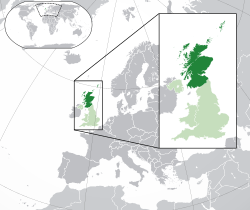 | |
| Agency overview | |
|---|---|
| Formed | April 1987 |
| Type | executive non-departmental public body |
| Jurisdiction | Scotland |
| Headquarters | Thistle House, 91 Haymarket Terrace, Edinburgh, EH12 5HE |
| Annual budget | £137,809 (Total cash expenditure 2015–16) |
| Minister responsible | |
| Agency executives |
|
| Parent department | Scottish Government |
| Website | www |
| Map | |
 Scotland in the UK and Europe | |
| Part of a series on |
| Scots law |
|---|
 |
The Scottish Legal Aid Board (SLAB) is an executive non-departmental public body of the Scottish Government, responsible for managing legal aid. It was established in April 1987, under the Legal Aid (Scotland) Act 1986, [1] taking over functions previously exercised by the Law Society.
Contents
In 2006 it had an annual budget of approximately £164 million.